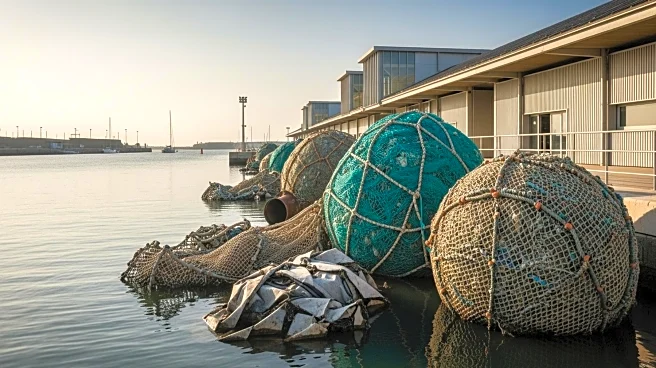What's Happening?
South Africa has launched its first harbour-based net recycling facility at the V&A Waterfront in Cape Town. The facility, a containerized micro-recycling pod, processes end-of-life fishing nets into high-value raw materials for reuse in plastic manufacturing. The initiative, led by OCEAN Action Network and Ocean Plastic Technologies, aims to prevent waste from reaching landfills or the ocean, reduce ghost fishing gear, and create economic opportunities. The project is supported by the South African Deep-Sea Trawling Industry Association and the Marine Stewardship Council’s Ocean Stewardship Fund.
Why It's Important?
This initiative represents a significant step towards building resilience in South Africa's blue economy by integrating environmental protection with economic activity. By transforming discarded fishing gear into reusable materials, the facility addresses marine pollution and supports sustainable development goals. The project aligns with South Africa's national commitments under the National Environmental Management: Waste Act and advances global goals such as Sustainable Development Goal 14: Life Below Water. It also complements the ambitions of the emerging Global Plastic Treaty, showcasing South Africa's leadership in environmental sustainability.
What's Next?
The recycling facility is designed for easy replication, with plans to deploy additional containers to other harbours. This scalable model aims to create a circular economy solution for marine plastic waste, promoting long-term sustainability and job creation. The project will also raise awareness about recycling among residents and visitors to the V&A Waterfront. As the facility becomes fully operational, it may inspire wider adoption of innovative recycling solutions across the continent, contributing to healthier oceans and economic upliftment.
Beyond the Headlines
The project highlights the power of partnership and innovation in driving real change, turning waste into opportunity and stewardship into action. It emphasizes the importance of collaboration between government, business, and civil society in addressing environmental challenges. The initiative may serve as a model for other countries seeking to balance economic growth with environmental protection, fostering a global movement towards sustainable practices in the fishing industry.









